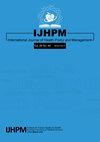Implementation of Medicines Pricing Policies in Ghana: The Interplay of Policy Content, Actors’ Participation, and Context
IF 3.1
3区 医学
Q2 HEALTH CARE SCIENCES & SERVICES
International Journal of Health Policy and Management
Pub Date : 2023-09-26
DOI:10.34172/ijhpm.2023.7994
引用次数: 0
Abstract
Background: Implementing medicines pricing policy effectively is important for ensuring equitable access to essential medicines and ultimately achieving universal health coverage. However, published analyses of policy implementations are scarce from low- and middleincome countries. This paper contributes to bridging this knowledge gap by reporting analysis of implementation of two medicines pricing policies in Ghana: value-added tax (VAT) exemptions and framework contracting (FC) for selected medicines. We analysed implications of actor involvements, contexts, and contents on the implementation of these policies, and the interplay between these. This paper should be of interest, and relevance, to policy designers, implementers, the private sector and policy analysts. Methods: Data were collected through document reviews (n=18), in-depth interviews (n=30), focus groups (n=2) and consultative meetings (n=6) with purposefully identified policy actors. Data were analysed thematically, guided by the four components of the health policy triangle framework. Results: The nature and complexity of policy contents determined duration and degree of formality of implementation processes. For instance, in the FC policy, negotiating medicines prices and standardizing the tendering processes lengthened implementation. Highly varied stakeholder participation created avenues for decision-making and promoted inclusiveness, but also raised the need to manage different agendas and interests. Key contextual enablers and constraints to implementation included high political support and currency depreciation, respectively. The interrelatedness of policy content, actors, and context influenced the timeliness of policy implementations and achievement of intended outcomes, and suggest five attributes of effective policy implementation: (1) policy nature and complexity, (2) inclusiveness, (3) organizational feasibility, (4) economic feasibility, and (5) political will and leadership. Conclusion: Varied contextual factors, active participation of stakeholders, nature, and complexity of policy content, and structures have all influenced the implementation of medicines pricing policies in Ghana.加纳药品定价政策的实施:政策内容、行动者参与和背景的相互作用
背景:有效实施药品定价政策对于确保公平获得基本药物和最终实现全民健康覆盖至关重要。然而,低收入和中等收入国家关于政策实施的公开分析很少。本文通过报告对加纳两项药品定价政策实施情况的分析,即对选定药品的增值税豁免和框架合同(FC),有助于弥合这一知识差距。我们分析了行动者参与、背景和内容对这些政策实施的影响,以及它们之间的相互作用。政策设计者、实施者、私营部门和政策分析人员应该对本文感兴趣,并与之相关。方法:通过文献综述(n=18)、深度访谈(n=30)、焦点小组(n=2)和协商会议(n=6)收集数据,有目的地确定政策参与者。在卫生政策三角框架的四个组成部分的指导下,对数据进行了专题分析。结果:政策内容的性质和复杂性决定了实施过程的持续时间和正式程度。例如,在FC政策中,谈判药品价格和标准化招标过程延长了执行时间。高度多样化的利益攸关方参与为决策创造了途径,促进了包容性,但也提高了管理不同议程和利益的必要性。实施的关键背景因素和制约因素分别包括高度的政治支持和货币贬值。政策内容、行动者和环境的相互关系影响了政策实施的及时性和预期结果的实现,并提出了有效政策实施的五个属性:(1)政策性质和复杂性,(2)包容性,(3)组织可行性,(4)经济可行性,(5)政治意愿和领导。结论:不同的背景因素、利益相关者的积极参与、政策内容的性质和复杂性以及结构都影响了加纳药品定价政策的实施。
本文章由计算机程序翻译,如有差异,请以英文原文为准。
求助全文
约1分钟内获得全文
求助全文
来源期刊

International Journal of Health Policy and Management
Health Professions-Health Information Management
CiteScore
5.40
自引率
14.30%
发文量
142
审稿时长
9 weeks
期刊介绍:
International Journal of Health Policy and Management (IJHPM) is a monthly open access, peer-reviewed journal which serves as an international and interdisciplinary setting for the dissemination of health policy and management research. It brings together individual specialties from different fields, notably health management/policy/economics, epidemiology, social/public policy, and philosophy into a dynamic academic mix.
 求助内容:
求助内容: 应助结果提醒方式:
应助结果提醒方式:


